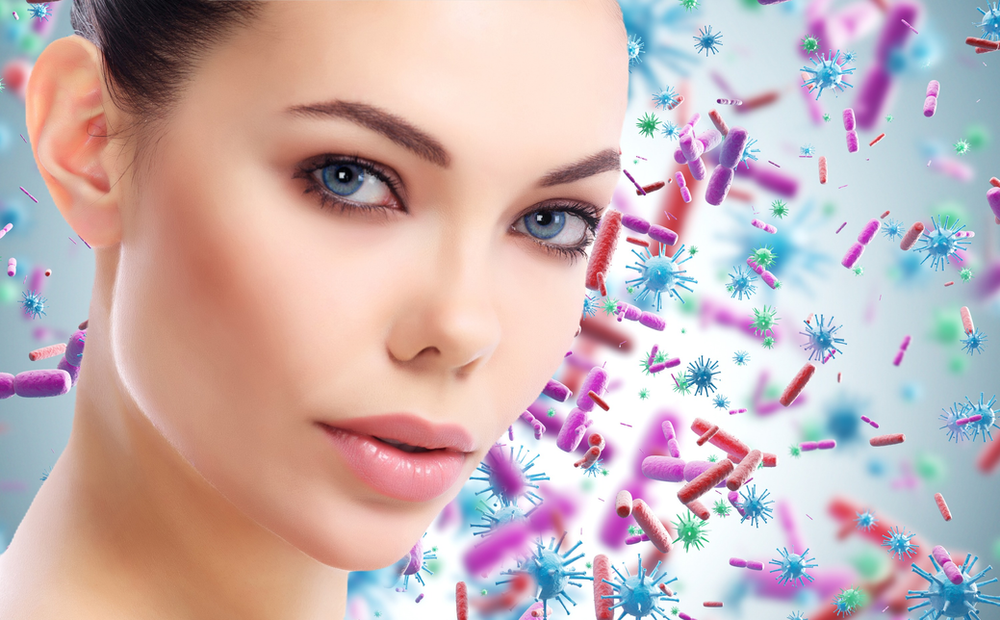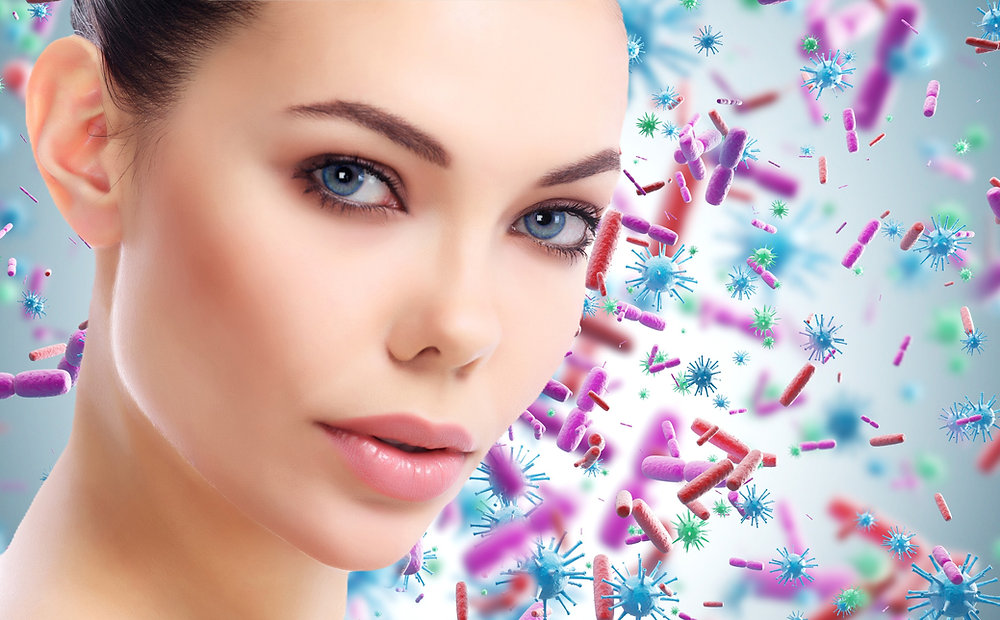
Is your skincare upsetting your skin microbiome?What is the skin microbiome?Bacteria isn’t always bad. Our skin is home to a diverse ecosystem of bacteria, fungi, and other microorganisms that form the skin microbiome. Before you say yuk and close this post… be aware that this delicate balance of microorganisms plays a crucial role in maintaining healthy skin. They protect against harmful pathogens and help regulating inflammation. Recent studies suggest that the skin microbiome may provide an additional layer of protection against skin damage from UV rays from the sun. However, the use of certain skincare products can disrupt this balance and lead to skin issues. Some ingredients in skincare products, such as harsh detergents, high potency retinoids (tretinoin) and overuse of strong exfoliating acids (AHAs) can alter the composition of your skin microbiome, leading to imbalances that manifest as conditions like acne, eczema, and sensitivity.One common culprit in disrupting your skin microbiome is the overuse of antibacterial ingredients. These might be prescription antibiotics, benzoyl peroxide or drying alcohols. While these ingredients may seem effective in combating acne or other skin issues, they can also indiscriminately kill beneficial bacteria that protects your skin. This disrupts the microbiome balance and makes the skin more susceptible to inflammation and infections. Furthermore, too frequent exfoliation (for you that might mean you’re exfoliating every night!) and the use of strong cleansers (which are most foaming cleansers) or toners that contain drying alcohols (like isopropyl alcohol). These products strip your skin of its natural oils, disrupting the microbiome and compromising the skin’s barrier function. This can lead to increased sensitivity, dryness, and inflammation. Remember that acne is basically a disease of inflammation. Try a gentler approach and focus on calming the inflammation first.A few years ago skincare companies were touting the benefit of adding probiotics to your skincare routine. Probiotics are the good bacteria in your skin microbiome. The good bacteria in our skin keeps your skin balanced and healthy. Adding probiotics to skincare products sounds good, but it presents a few problems. The first is, you have to use live bacteria for it to work. Something that’s been sitting in a jar is probably not alive. Plus, formulators not yet sure how to introduce the right probiotics to the skin microbiome that will survive (in the jar or on the face) and populate the skin with the right microbes. But, the research is looking promising. So keep a lookout for new discoveries.Since there is a connection between your gut microbiome and your skin microbiome you may want to focus on reinforcing your gut microbiome. Studies show that the health of your gut microbiome greatly affects the health of your skin. Because of this, taking care of your skin means you also need to take care of your gut. Many acne clients have seen positive progress (skin clearing) by addressing how their diet can quiet inflammation that affects their skin. You can support your gut microbiome by eating a healthy, whole food-based diet, avoiding processed foods, drinking plenty of water, avoiding overconsumption of alcohol, dairy, and refined sugar. Plus, getting plenty of sleep at night.Eat High Fiber Foods: They Are Full of Prebiotics. Moving away from skincare products, it is equally important to eat foods that are rich in prebiotics; the food that feeds the good bacteria within the gut. This in turn fosters a healthier skin microbiome. Think of it as skincare from within. This means you should eat high-fiber foods such as oats, almonds, cooked beans, and lentils.Eat Probiotic-Rich Foods DailyJust as you should feed your microbiome prebiotics, you can also choose to add probiotic-rich foods directly thru your diet. There are certain foods that have probiotics that help support your gut microbiome. Foods like yogurt, kefir, tempeh, kimchi, miso, pickles, and kombucha are all good choices as probiotic foods.Back to Skincare. The best way to support your skin microbiome is to be gentle with your skin. Don’t try to over clean your skin by scrubbing off your skin microbiome. Instead, baby your skin to promote the good bacteria on your skin. When you choose natural oils (especially jojoba oil) in your skincare products know that they have properties that promote a balanced microbiome as well as offering an extra protective layer to moisturize your skin. Nourishing oils create an environment that feeds good bacteria while keeping the harmful ones at bay. Soothing ingredients, especially antioxidants, reduce inflammation and promote a balanced skin microbiome. Our skin microbiome is held in a delicate balance where too much oxidative stress may lead to unhealthy skin and even faster aging. A combination of polyphenol rich antioxidants offers extra protection for your skin. Make sure you also eat a diet that is rich in antioxidants. Foods such as blueberries, dark chocolate, spinach, and pecans are abundant in antioxidants which help to neutralise free radicals and support skin health from within. Moisturizers that provide a layer that protects your skin’s barrier include ceramides and shea butter as part of their formulation for dry skin, that may have a compromised barrier. Plus, the polyphenol antioxidants in green tea and licorice root extract that calm inflammation, help to nourish and maintain a healthy skin microbiome.Super Antioxidants that Support Your Skin MicrobiomeNiacinamide – (also known as vitamin B3) is a powerful antioxidant that improves the skin’s texture and tone. It reduces fine lines, wrinkles and hyperpigmentation and exhibits anti-inflammatory properties. Thanks to its ability to calm inflammation, niacinamide can also soothe breakouts, improve skin’s barrier, help fight redness and support your skin microbiome. You’ll find niacinamide in sufficient amounts in our AGELESS longevity serum and Illuminate glow enhancing hydration cream.
Resveratrol – is known as the longevity molecule thanks to its impressive anti-aging abilities. This antioxidant is found in the skin of fruits like grapes and berries. Resveratrol serves as the plants’ defensive armor—and has a similarly reparative effect when used in skin care products. Resveratrol feeds your skin microbiome and is anti-inflammatory, which calms the skin, reducing visible inflammaging. You’ll find resveratrol in our REVITALIZE cell therapy.
Polyphenols – There are thousands of polyphenols (resveratrol is one) which are found in fruits, vegetables, green or black tea and other botanicals. These compounds possess anti-inflammatory, immunomodulatory and antioxidant properties that help to prevent UV-induced skin photodamage. Studies show that consumption as well as topical use of polyphenol rich ingredients helps improve our skin’s natural defense against oxidative stress via the skin microbiome. You’ll find polyphenols is most abundant in our SUNRISE SOLUTION.
Oligosaccharides are fermented carbohydrates with potent prebiotic action that helps restore equilibrium to the skin’s microflora. This stimulating effect boosts the skin’s defense system. Look for it in our Ginseng Tea Facial Rinse.
Astaxanthin – recent scientific revelations have shed light on astaxanthin’s remarkable ability to nurture a flourishing skin microbiome, tipping the scales in favor of those beneficial bacteria. This orange pigment from Hawaiian microalgae is 1000 times more effective in protecting cell membranes and skin lipids than Vitamin E. It supports the formation of SOD (superoxide dismutase), catalase and glutathione. These are the three most important antioxidant enzymes in cells. It protects skin from inflammation, surface dryness, DNA damage by UV, and signs of glycation. Astaxanthin can be found in sufficient amounts in our Revitalize Cell Therapy.What else can we do to support our skin microbiome?Spend time in nature. According to the Environmental Protection Agency, Americans spend over 90% of their lives indoors. We’re just not getting enough exposure to plants, fresh air or dirt. Why does this matter? Soil represents one of the most diverse ecosystems on the planet. It’s home to a wide variety of beneficial bacteria. When you’re exposed to the outdoors you create a more diverse the skin microbiome The more diverse your skin microbiome is the healthier it becomes.
Sweat It Out. Working up a sweat during your workout doesn’t seem like it would be good for your skin. – especially since sweat can make eczema itchier. However, while the perspiration sits on the skin, it helps build the skin’s microbiome. Because sweat contains the antimicrobial peptide dermcidin it helps protect your body from harmful germs. Breaking a sweat not only has mental, physical, and emotional health benefits, it may also be strengthening for your skin flora.
Be Mindful of How You Shower.
The beneficial microorganisms living on your skin are thought to feed off the naturally occurring oils on your skin. When you over-shower, you strip your skin of these oils and potentially harm your skin microbiome. Most of us shower with harsh, drying soaps in hot water for a fairly decent amount of time. There is such a thing as being too clean. To help protect your skin’s natural oils, use a detergent free body wash. Try taking shorter showers and shower in lukewarm (not hot) water.
Minimize Stress.
Busy, stressed… and itchy? Research shows psychological stress has the ability to impact the skin microbiome. It’s no wonder then that there’s a strong connection between mental stress and eczema flare-ups. When you’re in a stressful situation, your body enters fight-or-flight mode. This response causes an increase in adrenaline and cortisol (stress hormones). When your body creates excess cortisol, this sets off an inflammatory response. And we know inflammation plays a big role in upsetting the skin microbiome. In conclusion, be mindful of the impact your skincare products, diet and lifestyle have on your skin microbiome. It’s crucial for maintaining a healthy, radiant skin. By choosing products that support rather than disrupt the skin’s natural biome balance, you can promote a harmonious relationship with your skin microbiome and achieve a glowing complexion from the inside out.Elizabeth believes in “Longevity Skincare”, the idea that beautiful skin can endure throughout one’s lifetime when utilizing the best that science and nature has to offer. LONGEVITY is a science – based skincare line that appreciates skin of all ages. LONGEVITY by Elizabeth Renee provides hydration, nutrition and protection from environmental aging. Your skin will receive high performance ingredients to help energize and repair its cells, resulting in a healthy skin with an enduring, vital glow.
